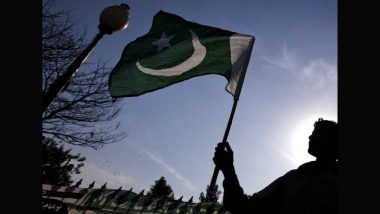Islamabad, Nov 21: Pakistan Defence Minister Khawaja Asif said on Monday that the process of appointment of the next army chief has started and would be completed by November 25, with five or six top generals in the race to succeed incumbent General Qamar Javed Bajwa.
"The process for appointment of the highest posts of army has started from today. By the grace of God, it will be completed soon, by fulfilling all constitutional requirements,” Asif tweeted. Under the Pakistan Army Act (PAA) 1952, the Ministry of Defence (MoD) should issue the 'discharge summary' of the incumbent Chief of Army Staff (COAS) to pave the way for the appointment of his successor. Pakistan Defence Ministry Recommends Five Names to PMO As Successor to Army Chief General Qamar Javed Bajwa, Says Report.
Gen. Bajwa, 61, is scheduled to retire on November 29 after a three-year extension. He has ruled out seeking another extension. Separately, in an informal talk with reporters in Islamabad, the defence minister said that a formal recommendation having the names of five or six top three-star generals would be sent by the defence ministry to the Prime Minister's Office.
The minister also said that there was no deadlock over the appointment of the army chief. "There is no deadlock. Once the summary is received, then a discussion will be held," he said.
He said the prime minister would take the army leadership into confidence, following which a decision would be taken. "I hope the process of appointment will be completed by Nov 25,” he said. Though the discussion about the new appointment is focused on the army chief, another key appointment of the Chairman Joint Chiefs of Staff Committee (CJCS) will also be made at the same time. Hence two lieutenant generals will be promoted as four-star generals.
The CJCS is the highest authority in the hierarchy of the armed forces but the key powers including mobilisation of troops, appointments and transfers lie with the Chief of Army Staff which makes the person holding the post as the most powerful in the military. With these powers comes the political clout, making the army chief as the most powerful in the Pakistani system.
The powerful Army, which has ruled Pakistan for more than half of its 75-plus years of existence, has hitherto wielded considerable power in matters of security and foreign policy.
The Prime Minister after receiving the names of senior most generals would pick one each for the CJCS and COAS and send the recommended names to the president who would appoint them as per laws of the country. The recommendation of the prime minister is binding on the president but the latter can delay the appointment for some time. Some media reports showed that the president can hold the summary for appointment for 25 days.
However, the government official rejected the reports that the president could delay the appointment.
Special Assistant to the Prime Minister on Law and Justice Irfan Qadir told Dawn newspaper that President Arif Alvi could not hold the decision as under Article 243 of the Constitution the appointment of chief of the army staff was solely a function of the federal government and not the president.
"This article clarifies that command and control of the army rests with the federal government and it has further been defined in articles 90 and 91 of the Constitution,” he added.
"[The] president cannot delay the summary and has to sign it at once,” he said.
The incumbent General Bajwa would retire on November 29 and the new chief should be appointed before that date for smooth transfer of power. There has been extraordinary interest in the appointment of his successor as many believe ousted prime minister Imran Khan's long march is linked to the change of command in the Army.
He has asked his supporters to gather in Rawalpindi on November 26, two days before Gen Bajwa hands over the baton to the new Army chief.
A senior government official dismissed speculation on Sunday that there has been any civil-military deadlock over the key appointment.
As per the seniority list, Lt General Asim Munir, Lt General Sahir Shamshad Mirza, Lt General Azhar Abbas, Lt General Numan Mahmud and Lt General Faiz Hameed are in contention for the job of chairman joint chiefs of staff committee and the army chief. Conspiracies To Attack Former Pakistan PM Imran Khan, Journalist Arshad Sharif’s Murder Hatched in London: Report.
The debate over the appointment of the new chief has intensified since the Inter-Services Public Relations (ISPR), the media wing of the military, confirmed last week that General Bajwa would doff off his uniform on November 29. The debate is also linked to the current political stalemate stemming from Khan's long march demanding early elections.
Political observers are of the view that one of the objectives of Khan's long march is to influence the Army chief's appointment even though Khan has denied such claims.
Prime Minister Shehbaz Sharif recently paid a private visit to London where he consulted his brother and former prime minister Nawaz Sharif on the issue and after his return he took all coalition partners on board. The role of President Alvi has come to the limelight in the appointment process as some media reports claimed that he could hold the notification for 25 days.
Foreign Minister Bilawal Bhutto-Zardari on Saturday advised President Alvi against creating any “sort of disorder” in the army chief's appointment.
"It is the last chance for the president and he would have to bear any consequence for any disorder. As long as Arif Alvi sahab's role is concerned, his test has been taken before whether he will stay loyal to Pakistan, its Constitution, its nation and democracy or will he fulfil his friendship with [Imran] Khan sahib,” he said.
Former information minister Fawad Chaudhry in the Khan's government has said that President Alvi would fulfill his constitutional responsibility regarding the appointment of the army chief. "Let me just clarify that whatever step the president takes will have complete backing from Imran Khan,” he tweeted.
Alvi is key in the appointment as Prime Minister Shehbaz will move the summary which will be signed by the president. He cannot reject the Prime Minister's recommendation but delay it for a brief period.













 Quickly
Quickly





















